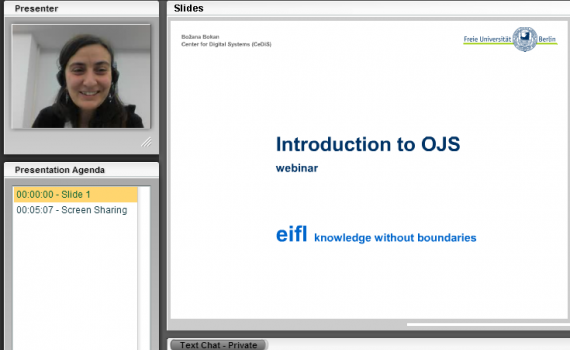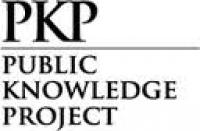
Another Open Journal Systems (OJS) webinar from EIFL's FOSS and Open Access programmes has been held, with 41 delegates from 21 countries including Macedonia, Kenya and Thailand.
The webinar took place on Wednesday 20th November 2013. It was delivered by Bozana Bokan of the Centre for Digital Systems (CeDiS) at the Freie Universität Berlin, Germany.
Bozana provided a few slides giving many useful links to OJS-related resource and community sites (see below for these) but the majority of the 90-minute session was given over to a live demonstration of the software.
Bozana worked through each of the main elements of the OJS process, explaining each step and demonstrating it for the delegates, taking questions at each stage before moving on to the next stage.
View a instantpresenter recording of the webinar here. (If your connection is too intermittent to view the recording online, we can provide it to you as a Zip file to download and view offline - just contact simon.ball [at] eifl.net)
Download Bozana's slides here.
Want more information about Open Journal Systems?
Open Journal Systems (OJS) is a FOSS tool that was designed to facilitate the development of open access, peer-reviewed publishing, providing the technical infrastructure for the online presentation of journal articles, and also an entire editorial management workflow, including article submission, multiple rounds of peer-review, and indexing.
The software itself is designed so that you can build up your installation from the core tool using a range of 'plug-ins' (such as the recently announced Article Level Metrics, for example), so that installing new developments does not require a complete change of the entire code base. Some of the tools that have already been developed include facilitating indexing in Google Scholar, providing RS/Atom syndication feeds, and facilitating COUNTER statistics generation and reporting.
The main features according to the OJS homepage are:
- OJS is installed locally and locally controlled.
- Editors configure requirements, sections, review process, etc.
- Online submission and management of all content.
- Subscription module with delayed open access options.
- Comprehensive indexing of content part of global system.
- Reading Tools for content, based on field and editors’ choice.
- Email notification and commenting ability for readers.
- Complete context-sensitive online Help support.
OJS is written in PHP, and uses either a MySQL or a PostgreSQL database. It can be hosted on Windows or Unix servers.
There were 6356 active OJS installations around the world last year (i.e. those that had some content uploaded during the year, so not counting legacy systems). OJS was created by the Public Knowledge Project, a partnership between four North American universities.
Forthcoming Webinar
We will also host a free Q&A webinar on Open Journal System (OJS) with Bozana Bokan on Thursday, November 28. Bozana will give a short presentation of about 20 minutes providing an overview of the OJS software functions and focusing on recent and new features. The main body of the webinar, however, will be a Q&A session with the audience. You are invited to submit questions in advance of the webinar as well as during the live session. See the link above for further details.

SHARE / PRINT









